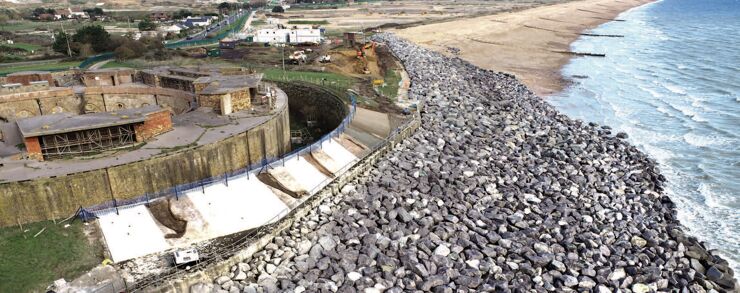
The Environment Agency in England, an NEC Users’ Group silver member, has used NEC to deliver one of its most sustainable coastal flood protection schemes to date. Completed in March 2021, the £25 million Hythe Ranges sea defences scheme in Kent saved 1667 t of carbon dioxide emissions by reducing the requirements for steel, timber and rock, and pioneering the use of an ultra-low carbon dioxide concrete.
The main contractor Van Oord was engaged under an NEC4 Engineering and Construction Contract (ECC) Option C (target contract with activity schedule) in December 2019 through the Environment Agency’s £220 million NEC-based marine and coastal framework. The scheme involved reducing flood risk to 787 properties on 3 km of Kent’s coastline between Dymchurch Redoubt in the west and Fisherman’s Beach in the east. Most of this coastal stretch is owned and operated by the Ministry of Defence as a live firing range known as Hythe Ranges.
The work included raising 30 timber groynes, recharging the shingle beach with over 300,000m3 of dredged material and constructing a 200 m long, 37,000 t rock revetment around the historic 200-year-old Dymchurch Grand Redoubt. NEC project manager Arcadis and NEC supervisor VBA were each engaged under an NEC4 Professional Service Contract (PSC) option E (cost reimbursable contract) through the Environment Agency’s £80 million NEC-based client support framework.
The project was completed on time and within budget despite being undertaken entirely during the Covid-19 pandemic. It was shortlisted for the Climate Resilience Project of the Year in the 2021 British Construction Industry Awards and was a runner-up in the International Excellence category at the 2021 Flood and Coast Awards.
Well-understood contract
Client project manager John Gower says NEC has been the Environment Agency’s procurement route of choice for many years. ‘It is reliable, well-understood and well-liked by us as the client and by our many framework contractors and consultants.’
He says the whole project went really well. ‘Inspired by the NEC requirement to act in a “spirit of mutual trust and co-operation,” we had great collaboration within the project team. This in turn helped us to achieve 1667 t of carbon dioxide emissions savings through jointly conceived efficiencies innovation.’
The emissions savings were primarily achieved through realigning a steel sheet pile wall to reduce steel by over 75%; optimising the rock revetment toe to reduce rock volume by 30%; reducing the number of groynes to cut timber use by 30%; and through the pioneering use of Cemfree concrete – the largest exposed volume of ultra-low carbon dioxide concrete used to date on an Environment Agency project.
Gower says NEC contract management processes also helped to ensure excellent communications throughout the works. ‘The NEC early warning mechanism really helped to head off problems early on. In addition, we held an early lean planning meeting, weekly updates and monthly progress meetings to supplement our project board governance meetings.’
He says the project team used NEC compensation event logs to control spend and forecast throughout the project. ‘We were within 3% of our monthly forecasts nearly all the way through the construction phase. The ECC Option C pain/gain threshold was set at 20% target price with a 50% spilt, and we finished on time and below target cost, so in gain − a nice win for both parties.’
BENEFITS OF USING NEC
- NEC4 contract suite was a reliable contract choice that was well understood and well-likedby the client and its framework contractor and consultants.
- NEC requirement to act in a, ‘spirit of mutual trust and co-operation,’ led to great collaboration within the project team, which in turn helped to achieve a big cut in carbon dioxide emissions.
- NEC early warning mechanism helped to avoid problems early on, and NEC contract management processes ensured excellent communications throughout.
- ECC Option C pain/gain share mechanism successfully incentivised both parties to deliver the project on time and under budget.




